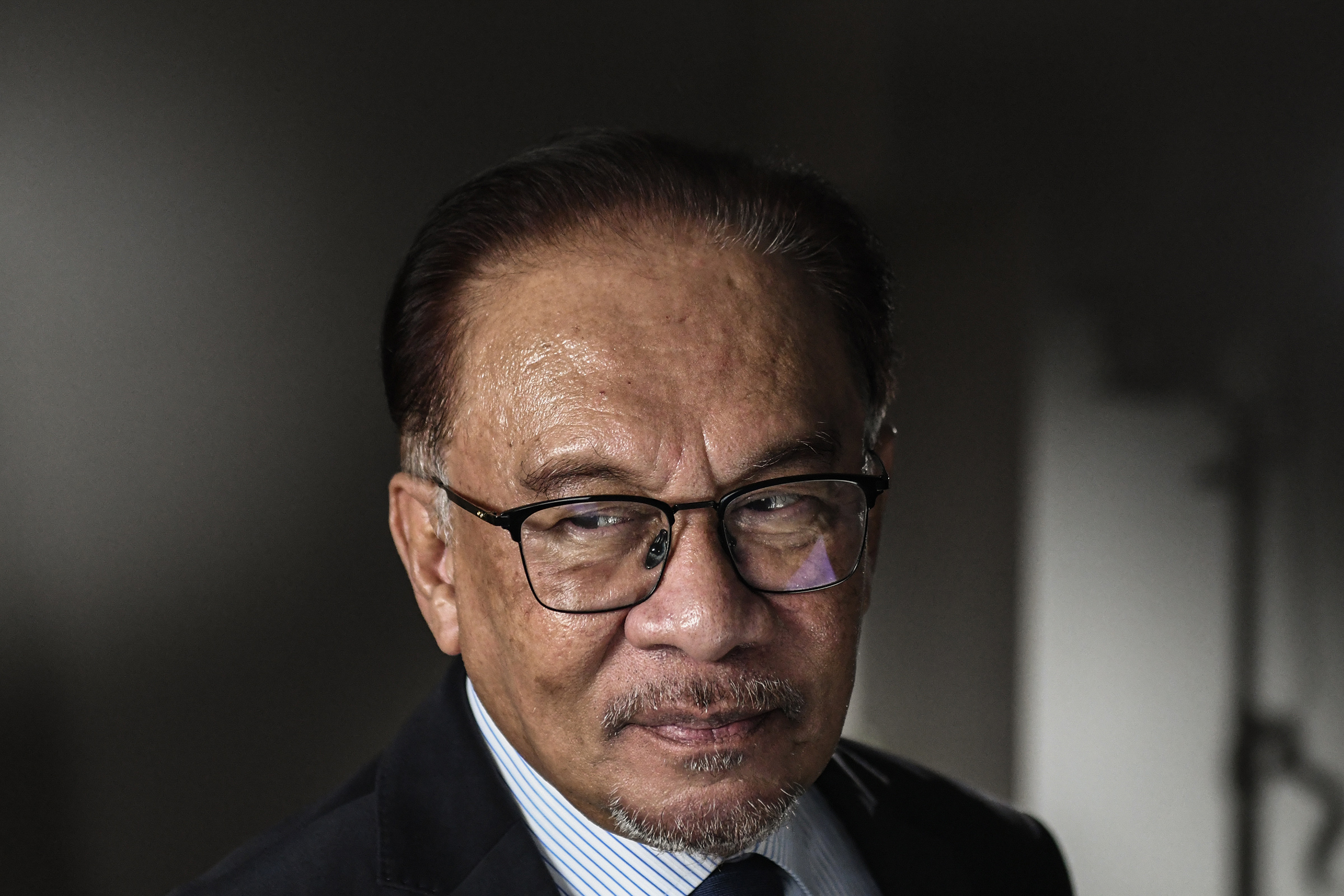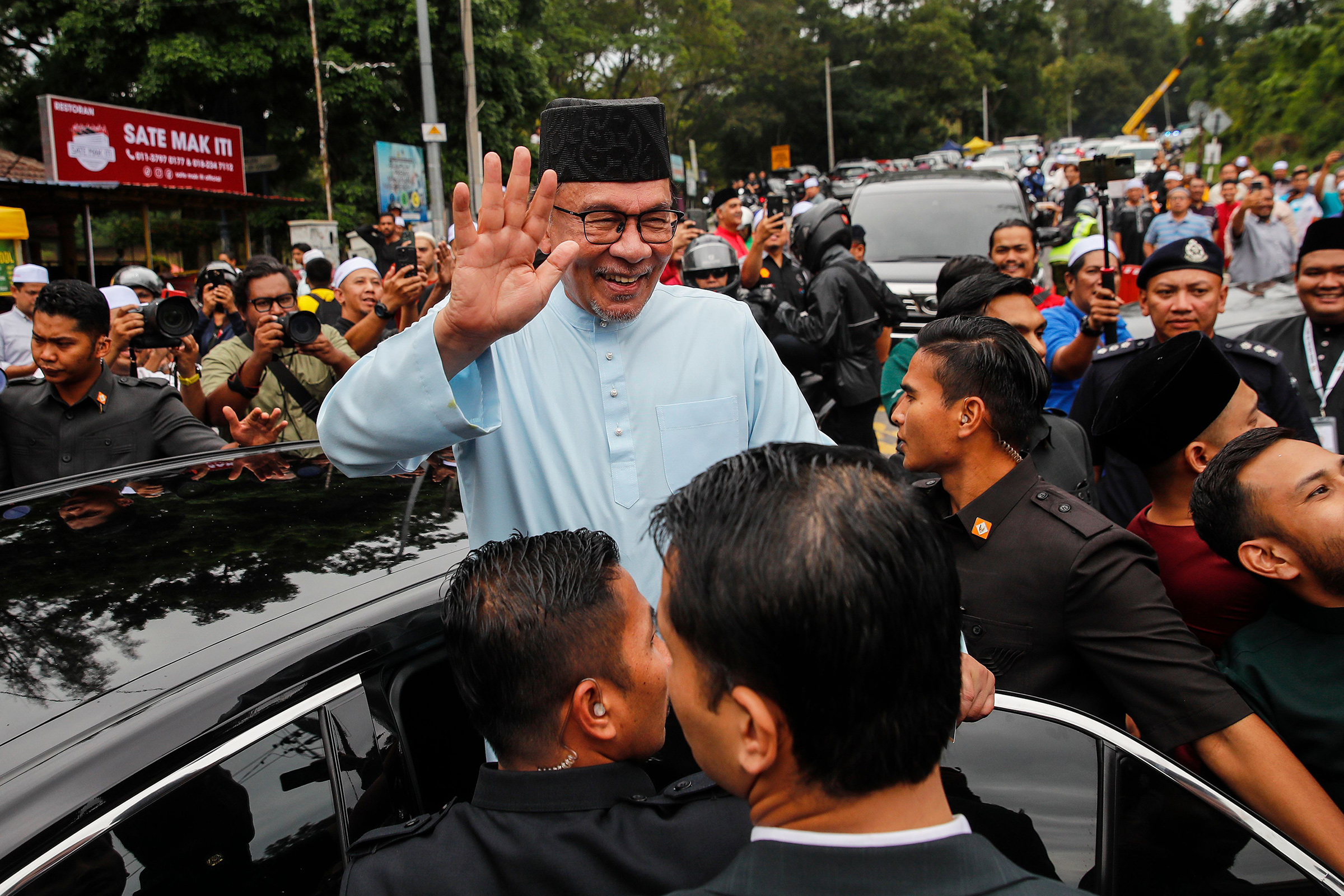
Anwar Ibrahim’s political journey is the stuff of legend. As an Islamist student leader, he was plucked out of his relative youth in the early 1980s to join Malaysian Prime Minister Mahathir Mohamad’s government. He rose through the ranks for a decade and a half, becoming heir apparent—only to give it up in 1998 to create a movement demanding a set of political changes known as reformasi. He endured repression, trumped-up sodomy charges, and torture during the quarter-century that followed. But power finally came back to Anwar, now 76: last November, after a divisive election, he cobbled together a unity government that made him Prime Minister.
Now, nearly a year into office, he’s grappling with the rise of the Malaysian Islamic Party (PAS) that is polarizing society, a flagging economy, and the continued fallout from the scandal that saw former Prime Minister Najib Razak of the United Malays National Organisation (UMNO) party convicted of corruption in 2020. Anwar spoke to TIME about these issues and more—from Malaysia’s place in great-power competition to a civic culture of corruption.
Read More: In Conversation With the Journalist Who Exposed the World's Biggest Corruption Scandal
TIME: The Biden Administration sees a global war between democracy and autocracy, between a rules-based, U.S.-led world order and one led by Russia and China. Where does Malaysia fit in?
Anwar: The bifurcation has not helped regional or international cooperation. But there’s not much that small countries like Malaysia can do about it, except maintain the centrality of ASEAN [Association of Southeast Asian Nations], in our foreign policy. We should be fiercely independent, and interact and engage with both. Fortunately, we have excellent relations with both East and West. My intention is to make sure that Malaysia emerges as a viable and mature democracy.
The U.S. wants you to pick a side. How do you plan to stay out of this?
We make it very clear that China is an important neighbor, an important trading nation. We do have issues [with China] like the South China Sea, but the engagement has been working, in the sense that we have stated our position and I’m reassured that China said they will not do anything without meaningful exchanges and dialogue. At the same time, the U.S. is a longtime ally and friend, and we continue to engage with them. But we cannot be intimidated in any way. A good example is our decision on 5G. The previous administration, my predecessor, decided to have just one network system, [from Swedish firm] Ericsson. My position was to continue it because it is an important technology. But why shouldn’t we utilize the best of both worlds? So we chose [Chinese tech giant] Huawei to also participate. Of course, this displeased some people. But I can’t help it. My commitment and loyalty are to the people of Malaysia.
More From TIME
Your government recently objected to a map China released that lays claim to almost the entire South China Sea. Have you raised it with China?
Yes, in fact, I raised it publicly. I was one of the few ASEAN leaders who said it publicly in front of Chinese Premier Li Keqiang in the ASEAN East Asia dialogue. But to me, what is reassuring is the categorical statement by Li that they will honor and respect the claims of others.
Have they? There've been reports of Chinese ships in Malaysian waters, for example.
We’ve raised objections if our navy identifies what we consider incursions—although they claim it’s also their territory. But thus far, when things are raised, or a polite note of concern is expressed, they do not necessarily withdraw but at least give some deference or consideration. Which means they do not, for example, aggressively enter our waters.
Not aggressively?
Yes, yes. When we identify cases of them entering our waters, and give a note of protest, then they have steered away on a number of occasions.

Malaysia is a rare example of a democratic Muslim-majority country. But Malay-Islamist supremacist rhetoric is on the rise. How do you plan to combat it?
First, economic development. A more just, equitable system so that no community or part of the country is seen to be ignored or marginalized. Second, of course, is education, because extremism, racism, religious bigotry, breed easily among the more ignorant segment of the population. When I say ignorant, I don’t mean you’re not qualified, you don’t go to university. I mean the lack of understanding of the total message of a religion dependent on some of the mullahs and sheiks, with their very narrow, obscure interpretation. Third, to make them realize that Malaysia, although it is a predominately Muslim country, is a multiracial country. And we have survived hundreds of years with the presence of Buddhists, Hindus, and Christians. There is no reason why you should upset this and cause enmity.
Have you ever considered asking PAS to come on board, because your government is a coalition government?
On whether we are prepared to engage with them, of course we do. We must. And I’ve sent [an invitation] to them ... Yes, I have been open to the idea from the beginning. After all, this is a unity government and we do what is best for our country. But of course, we are going to draw a line. Islam is the religion of the Federation [of Malaysia], but this is a multireligious country and I want every single citizen in this country, of all religious persuasions, to know that they have a place in this country.
What has PAS's response been?
There has not been a clear rejection nor a positive response. The political climate is still a bit heated, so we’ll let it cool off for some time.
OK, so is it possible at some point?
I don’t want to preclude that. Of course, contingent upon these major policy conditions being accepted.
You cannot achieve all the reformasi—whatever you thought about it back then—in one year or in the next few years. So if you were to prioritize two or three things, what would they be?
Governance. I mean, in this country, the plundering was a mess and corruption is systemic. And if you stop that, it is a major success story. Not a single tender in the past nine months has been awarded through a negotiated process. There is [now] a proper tender, a transparent system. This is a major departure from the corrupt practices of the past. In Parliament, we have formed umpteen select committees. They can summon ministers and civil servants, question them. In the judiciary, there is not one case of appointments or decisions that I’ve interfered with.
Your coalition partner UMNO’s stated demand is to have a pardon for Najib. You would be one of the members of the pardoning board if it ever came to that. How would you treat it?
As I’ve said publicly, our system in the pardoning board is a process. It is the sole discretion of King [Yang di-Pertuan Agong].
But on your advice?
There are a few issues that the King may not seek the advice of the Prime Minister—on the issue of pardons, on the issue of investiture, and some issues pertaining to Islam and Malay customs. I trust the wisdom of the King to protect the Constitution.
So you would be impartial to it?
I mean, every single convicted person has a right to submit his or her appeal to the pardons board. And it is the duty of the pardons board to consider each case professionally. That’s all that we will do. And each member will give their views to the King. The King has a final say. Of course, they say the King can act on the advice of the Prime Minister. But unlike normal government duties, this advice has its limit, because the King has discretion, as I said.
I get that. But if the case came to you tomorrow, what would you do?
I will think about it.
Statesmen and leaders think about legacy. What would you want yours to be as Prime Minister?
Sounds like you are asking me to retire early? I would say this: this man from the village who came up, suffered in the process, and really wanted to do his best for his people and his country. That’s it.
That is a very diplomatic answer.
No, no, it’s not. I just want them to remember, here is Anwar, who is probably crazy in many ways, fought hard, suffered immensely in the process, but he really meant well. There’s an honest answer.
Do you have any regrets?
Hmm, Frank Sinatra, “My Way.” Yes, regrets, I have a few. I should probably have been a bit more patient, a bit wiser. But no one in their younger days was patient and wise.
More Must-Reads from TIME
- Inside Elon Musk’s War on Washington
- Meet the 2025 Women of the Year
- The Harsh Truth About Disability Inclusion
- Why Do More Young Adults Have Cancer?
- Colman Domingo Leads With Radical Love
- How to Get Better at Doing Things Alone
- Cecily Strong on Goober the Clown
- Column: The Rise of America’s Broligarchy
Contact us at letters@time.com